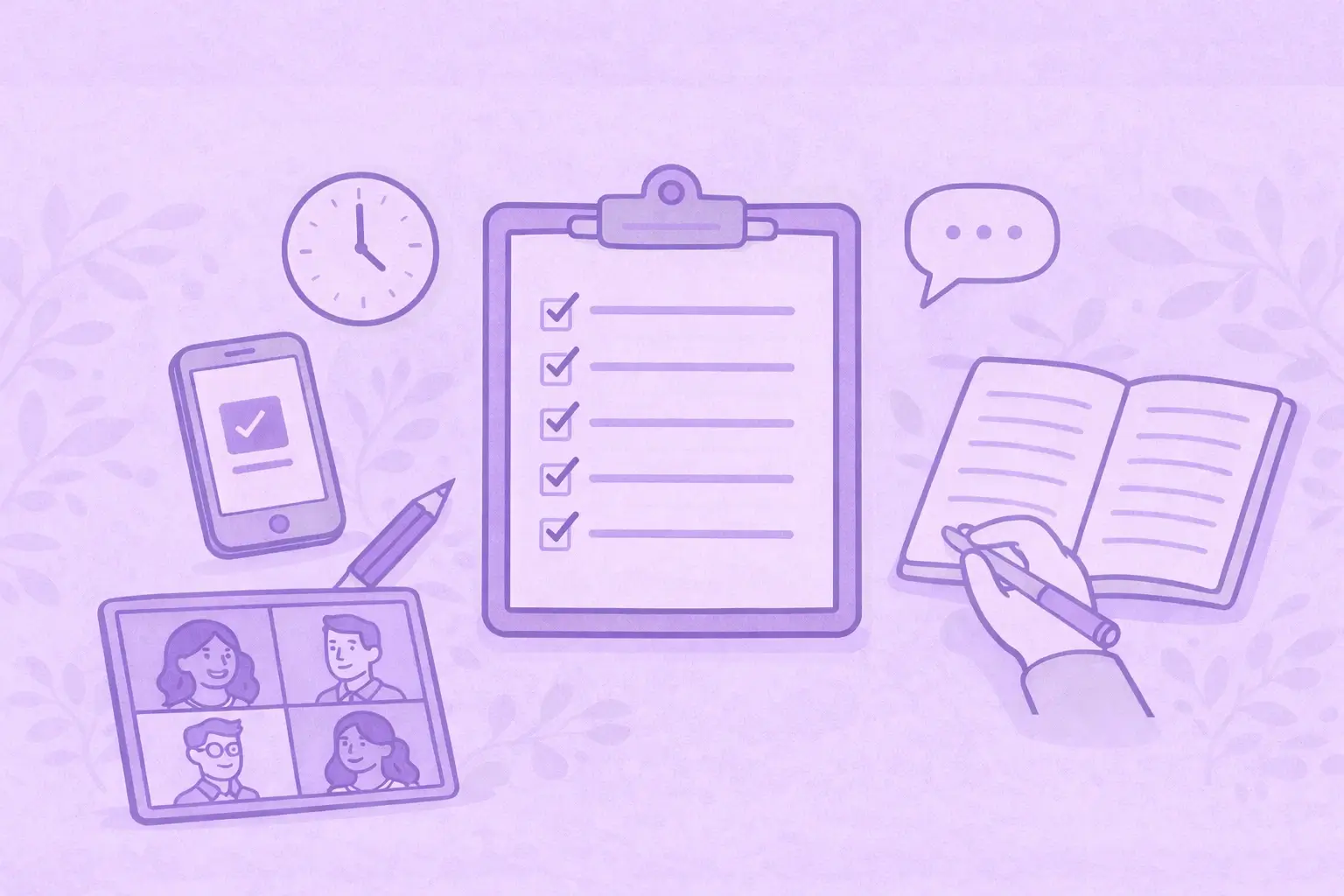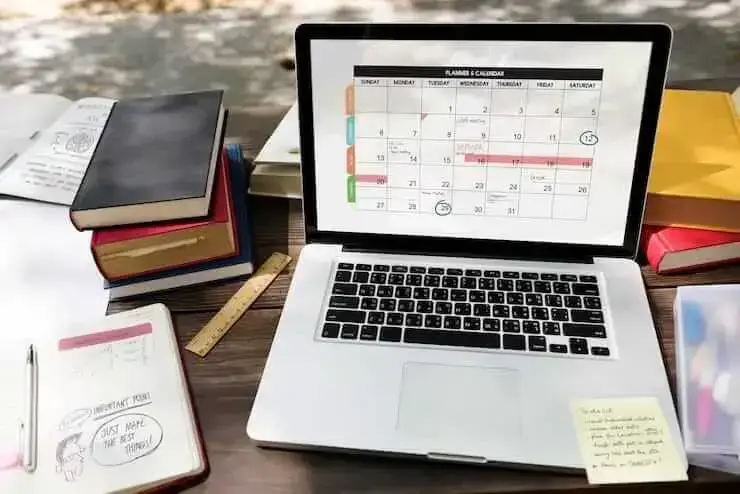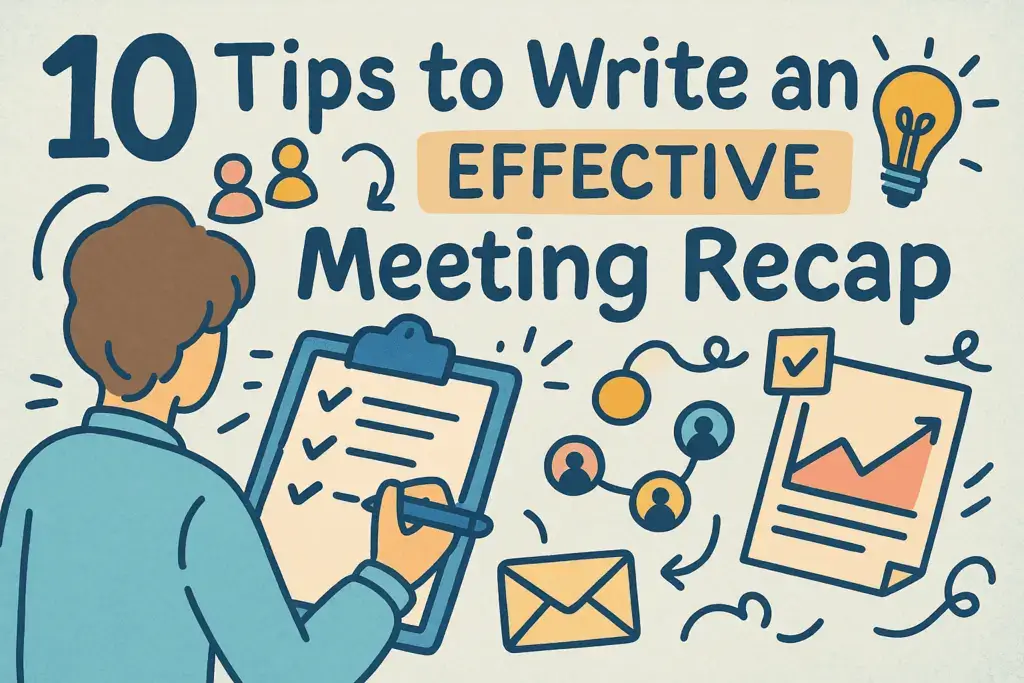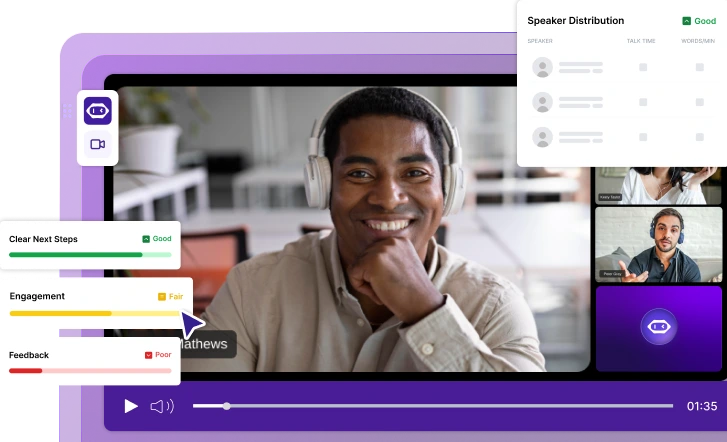Free Board Meeting Minutes Template + Best Practices
Use these free templates for board meeting minutes and discover best practices to capture and organize key discussions effectively.

✅ Free meeting recording & transcription
💬 Automated sharing of insights to other tools.

Image source: pch.vector on Freepik
Are you looking for a way to keep your board meetings organized and efficient? Look no further!
In this article, we provide free board meeting minutes templates along with best practices to ensure you capture all the essential information. Whether you're an experienced professional or new to this task, we’re here to help you streamline the process and enhance the effectiveness of your meetings.
Let’s dive in and find you the perfect board meeting minutes template!
What Are Board Meeting Minutes?
Board meeting minutes are an official record of what happens during a board meeting. They document the discussions, decisions, and actions that take place, providing a factual and detailed account of the meeting.
These meeting minutes serve several important purposes: they ensure transparency, help with accountability, and offer a historical record that can be referred back to for clarification or legal reasons.
What Should Board Meeting Minutes Include?
Board meeting notes capture the essence of your executive meetings, so you need to ensure they’re clear, concise, and only include relevant information to remain useful and effective.

Here’s what you must include in board meeting minutes:
- Date and time: Always note the meeting's date and time to organize records over time and verify that meetings occurred as scheduled.
- Type of meeting: Specify whether the meeting is a regular, special, or emergency session to provide context for the decisions made.
- Attendees and absence: List all members present and note any absences to determine whether the meeting reached a quorum and if the decisions made are valid.
- Guests: Record the names of any non-members who attended and their role during the meeting. This can include experts, potential partners, or special speakers.
- Reports: Summarize key points from reports presented during the meeting, such as financial reports, committee reports, or executive reports. Include any critical data or conclusions shared.
- Resolutions: These are significant decisions that impact the organization's direction. Detail any resolutions proposed and voted on, including the outcome of each vote.
- Actions: Document action items established during the meeting, including who is responsible for each task and any applicable deadlines.
- Additional information or instructions: Sometimes, additional notes or instructions that don’t fit into the board meeting agenda come up during the meeting. Depending on their importance, you may need to write them down.
Here are some optional things you can include in board meeting minutes:
- Formal notice: Indicate whether all required advance notices were sent out according to the bylaws to confirm the legality of the meeting.
- Quorum: Confirm that the number of members present meets the quorum requirement as defined in the bylaws to proceed with making official decisions.
- Departures and entries: Note any members who arrive late or leave early. This can affect quorum and voting outcomes and is important for accuracy in the minutes.
Board Meeting Minutes Templates
We put together 6 different example templates you can customize according to your preferences. Check them out below!
A. MeetGeek’s Board Meeting Minutes Template
If you are interested in how to record minutes of a board meeting, then MeetGeek has the perfect solution for you.
We offer readily made templates that you can further customize according to your needs, and our virtual AI assistant will join your board meetings and automatically update the blank fields with the information shared during the conversation.
This way, you get meeting notes tailored to your unique requirements while saving time and effort.
Here’s what our board meeting minutes template looks like in the beginning:
| I. Call to Order (5 minutes) Official opening of the meeting. Confirmation of the quorum. II. Executive Summary (10 minutes) Presentation of a brief overview of the company's current status by the CEO or Chairperson. III. Financial Report (10 minutes) CFO presents the financial health of the company, recent performance, and any forecasts. IV. Committee Reports (10 minutes) Updates from various committees (e.g., Audit, Compensation, Governance). V. Strategic Initiatives Update (10 minutes) Progress on strategic initiatives discussed in previous meetings. Introduction of new initiatives for discussion and approval. VI. Governance and Compliance (5 minutes) Discussion of any legal, compliance, or governance issues affecting the company. VII. Open Discussion and Q&A (10 minutes) Board members discuss key topics or concerns not previously covered. Questions and answers on presented topics. VIII. Action Items and Voting (5 minutes) Decisions on motions presented during the meeting. Establishment of action items for the next meeting. IX. Adjournment (1 minute) Official closure of the meeting. |
NOTE: Our virtual board meeting template features:
- A pre-filled, editable agenda that you can customize to suit your needs.
- Highlights (tags) to help you quickly identify key topics such as #compliance, #decision, #financial_health_status, #action_items, and #strategic_direction.
- Meeting KPIs that track important metrics, including Decision Implementation Rate, Financial Reporting Accuracy, Meeting Agenda Adherence, Member Participation Rate, Strategic Initiative Progress, Talk Time Ratio, Call Sentiment, and more. These KPIs give you a bigger picture of your meeting and help you improve the effectiveness of future ones.
B. Simple Board Meeting Minutes Template
| Organization Name: Date: Time: Start: [Time] | End: [Time] Location: Type of Meeting: [Regular/Special/Emergency] Formal Notice: [Confirmation that meeting notification was sent out according to the bylaws Attendees:Present:Absent: Guests:[List names and affiliations, if any] Quorum:[Confirm whether the quorum was met] Departures and Entries:[List any late arrivals or early departures] Reports: [Title of Report] Presented by [Name] Key points: [Bullet points of key details or figures] [Additional Reports as necessary] Resolutions: [List resolutions proposed, the person who proposed them, details of the discussion, and the outcome of the vote] Example: Resolution 1: [Title of Resolution] Proposed by: [Name] Discussion: [Brief summary] Vote: [Number in favor] in favor, [Number opposed] opposed, [Number abstained] abstained Result: [Passed/Failed] Actions:[List action items, the responsible person(s), and deadlines] Example: Action 1: Task: [Describe the task] Responsible: [Name] Deadline: [Date] Additional Information or Instructions:[Include any other important details or directives issued during the meeting] Next Meeting:[Date and time, if already scheduled] Minutes Prepared By:[Name and position, Date] |
C. Formal/ Directors Meeting Minutes Template
| Organization: [Organization Name] Date: [MM/DD/YYYY] Time: Start: [HH AM/PM] | End: [HH AM/PM] Location: [Meeting Location] Meeting Type: [Regular/Special/Emergency] Meeting Called to Order by: [Name of Chairperson] Secretary: [Name of Secretary] Formal Notice: [Confirmation that all necessary notices were issued in accordance with the organization’s bylaws.] Attendance: Board Members Present: [List names]Board Members Absent: [List names]Excused: [List names] Guests: [List names and reasons for attendance] Quorum: [State if quorum was established] Approval of Previous Minutes:Minutes from the meeting held on [Previous Meeting Date] were [approved as presented/amended details]. Departures and Entries:[List any members who arrived late or left early, noting times if relevant] Reports: President’s Report: [Summary of report] Treasurer’s Report: [Summary, include financial status and any motion required] Committee Reports: [Name of Committee]: [Summary of findings and recommendations] Resolutions:[Detail each resolution discussed, including mover, seconder, discussion summary, and voting outcome] Example: Resolution to Approve the Annual Budget: Moved by: [Name], Seconded by: [Name] Discussion: [Summary] Vote: Unanimous/Majority/With [Number] abstentions Status: Adopted/Rejected Actions:[List actions to be taken, individuals responsible, and deadlines] Example: Action Item: Review contract terms for new vendor Assigned to: [Name], [Position] Deadline: [MM/DD/YYYY] Executive Session: (if applicable)[Discuss any sensitive matters, outcomes, and any votes, without detailing confidential information] Additional Information or Instructions:[Any other information deemed important but not categorized above] Announcements:[List upcoming events, next meeting date, or other notifications] Meeting Adjournment: The meeting was adjourned at [Time] by [Name]. Next Meeting: Date: [MM/DD/YYYY] Time: [HH AM/PM] Location: [Venue] Minutes Prepared by:[Secretary’s Name], SecretaryDate: [MM/DD/YYYY] Reviewed and Approved by:[Name], [Title]Date: [MM/DD/YYYY] |
D. Staff Board Meeting Template
| Organization: [Organization Name] Date: [MM/DD/YYYY] Time: Start: [HH AM/PM] | End: [HH AM/PM] Location: [Meeting Location] Meeting Type: [Regular/Special/Emergency] Meeting Called by: [Name of Chairperson] Minutes Prepared by: [Name of Secretary] Formal Notice: [Confirmation that all necessary notices were issued in accordance with the organization’s bylaws.] Attendance: Board President: Board Members Present: [List names] Board Members Absent: [List names] Excused: [List names] Guests: [List names and reasons for attendance] Quorum: [State if the quorum was established] Approval of Previous Minutes:Minutes from the meeting held on [Previous Meeting Date] were [approved as presented/amended details]. Departures and Entries:[List any members who arrived late or left early, noting times if relevant] Reports: Chairperson’s Report: [Summary of report] Financial Report: [Summary, include financial status and any motions required] Committee Reports: [Name of Committee]: [Summary of findings and recommendations] Resolutions:[Detail each resolution discussed, including mover, seconder, discussion summary, and voting outcome] Example: Resolution to Approve the Annual Budget: Moved by: [Name], Seconded by: [Name] Discussion: [Brief summary] Vote: Unanimous/Majority/With [Number] abstentions Status: Adopted/Rejected Actions:[List actions to be taken, individuals responsible, and deadlines] Example: Action Item: Implement new HR software Assigned to: [Name], [Position] Deadline: [MM/DD/YYYY] Additional Information or Instructions:[Any other information deemed important but not categorized above] Announcements:[List upcoming events, next meeting date, or other notifications] Meeting Adjournment:The meeting was adjourned at [Time] by [Name]. Next Meeting:Date: [MM/DD/YYYY]Time: [HH AM/PM] Location: [Venue] |
E. Executive Monthly Meeting Minutes Template
| Organization: [Organization Name] Date: [MM/DD/YYYY] Time: Start: [HH AM/PM] End: [HH AM/PM] Location: [Meeting Location] Type of Monthly Meeting: [Regular/Special] Meeting Called by: [Name of Chairperson] Minutes Prepared by: [Name of Secretary] Formal Notice: [Confirmation that notification was properly issued in accordance with organizational policies.] Attendance: Executives Present:[List names] Executives Absent: [List names] Excused: [List names] Guests:[List names, affiliations, and reasons for attendance] Quorum: [Confirm whether the quorum was met] Approval of Previous Meeting’s Minutes:Minutes from the previous meeting held on [Date] were [approved as presented/amended details]. Departures and Entries:Note any members who arrived late or left early, including relevant times if necessary. Reports: CEO’s Report: [Key points and strategic updates] CFO’s Financial Summary: [Financial performance and any motions required] Board of Directors Updates: [Key developments and recommendations from each committee] Resolutions:[Detail each resolution proposed, including proposer, discussion points, and voting outcomes] Example: Resolution on Strategic Initiative X: Proposed by: [Name] Discussion: [Brief summary of discussion points] Vote: [Result of the vote] Status: [Adopted/Rejected] Actions:[Detailed list of action items, responsible persons, and deadlines] Example: Action Item: Overhaul of IT Infrastructure Responsible: [Name], CTO Deadline: [MM/DD/YYYY] Executive Session: (if applicable)[Discuss sensitive matters privately, record outcomes and any decisions made without revealing confidential details] Additional Information or Instructions:[Include any additional instructions or significant information shared during the meeting] Announcements:[List significant forthcoming events, further meeting dates, or other organizational announcements] Meeting Adjournment:The meeting was adjourned at [Time] by [Chairperson’s Name]. Next Monthly Meeting: Date: [MM/DD/YYYY] Time: [HH AM/PM] Location: [Planned Venue] Minutes Approved by:[Name], [Title], Date: [MM/DD/YYYY] |
F. Emergency Board Meeting Minutes Template
| Emergency Monthly Meeting Minutes Organization: [Organization Name]Date: [MM/DD/YYYY]Time: Start: [HH AM/PM] | End: [HH AM/PM] Location: [Meeting Location] Type of Meeting: Emergency Meeting Called by: [Name of Chairperson]Minutes Prepared by: [Name of Secretary] Formal Notice: [Confirmation that emergency notification was issued in compliance with organizational emergency procedures.] Attendance: Members Present: [List names] Members Absent: [List names] Excused: [List names] Guests: [List names and their reasons for attending, if applicable] Quorum: [State whether the quorum necessary for emergency decisions was met] Urgent Matters Addressed:[List the urgent issues that necessitated the emergency meeting] Reports: Immediate Actions Taken Before Meeting: [Summary of actions and decisions made before the meeting] Current Situation Overview: [Detailed report on the situation prompting the emergency meeting] Resolutions:[Detail each resolution discussed related to the emergency, including proposer, brief discussion, and voting outcomes] Example: Resolution to Allocate Emergency Funds: Proposed by: [Name] Discussion: [Brief summary] Vote: [Results of the vote] Status: [Adopted/Rejected] Actions Required:[List critical action items decided during the meeting, assigned responsibilities, and deadlines] Example: Action Item: Immediate repair of facility damages Assigned to: [Name], Facilities Manager Deadline: [Immediate/Specific date] Departures and Entries:Note any attendees who had to leave or join the meeting unexpectedly, with relevant times if necessary. Additional Instructions or Information:[Record any additional instructions given or crucial information shared during the meeting relevant to the emergency] Next Steps and Follow-Up:[Outline steps for monitoring the situation and any follow-up meetings scheduled] Meeting Adjournment:The meeting was adjourned at [Time] by [Chairperson’s Name]. Emergency Follow-Up Meeting: Date: [If scheduled] Time: [HH AM/PM] Location: [Venue] Minutes Reviewed and Approved by:[Name], [Title]Date: [MM/DD/YYYY] |
Board Meeting Minutes DO’s
When dealing with board meeting minutes, you must ensure that they’re not only accurate and complete but also serve as an effective tool for governance and accountability.
Here are the most important board meeting minutes do’s:
- Use your meeting agenda as a template
- Assign a minute-taker
- Use AI to record and transcribe your board meeting
- Set expectations for board meeting minutes
- Adopt an objective tone
- Include all relevant details
- Proofread and share the minutes
- Follow legal requirements
1. Use Your Meeting Agenda As a Template
Starting your minutes with the meeting agenda as a template is an efficient and organized approach. The agenda typically includes all the topics that will be covered during the meeting, so using it as a template ensures that your minutes are comprehensive and structured logically.
This method helps the note-taker track discussions and decisions against the planned agenda items, ensuring that board members and missing participants don’t miss anything important.
2. Assign a Minute-Taker
Speaking of note-takers, designating a specific person to take minutes is crucial for creating accurate and consistent meeting records.
The minute-taker should be someone who has good listening and typing skills, is familiar with the meeting participants, and understands the topics discussed.
Usually, the board secretary is in charge of this task. However, in times of need, this role can be rotated among staff to share responsibilities and to give everyone an understanding of the process, which can enhance overall team involvement and awareness.

3. Use AI to Record and Transcribe Your Board Meeting
Modern AI tools like MeetGeek can record your meetings and automatically transcribe the conversations into text, which everyone can further refer to as the documentation of whole discussion and key highlights.
This not only saves time but also reduces errors in capturing what was discussed,
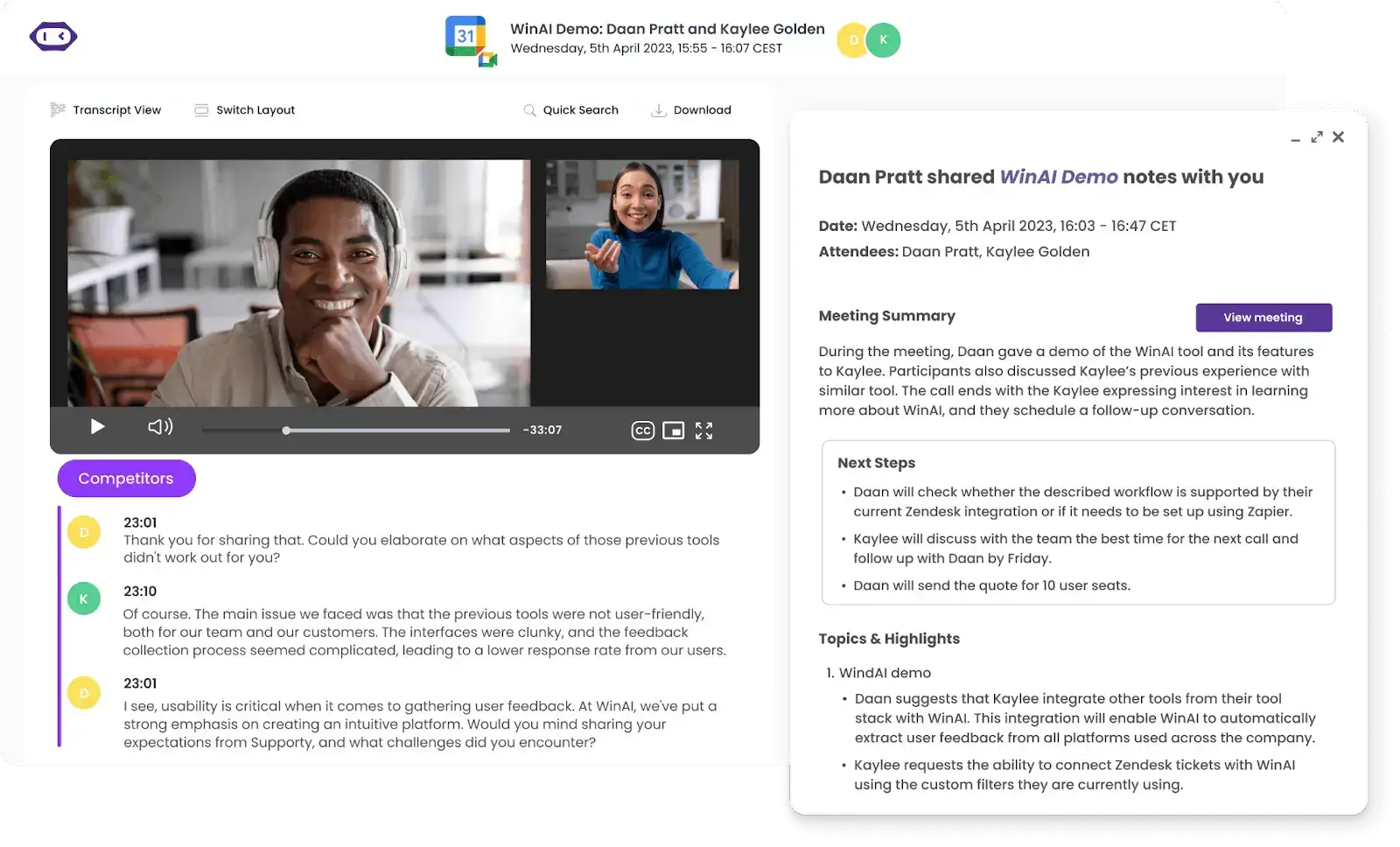
Here’s how MeetGeek can make your board meetings a model of efficiency and collaboration:
- Meeting recording and transcription: With MeetGeek, every board meeting is recorded and transcribed automatically. This is especially useful for board members who can't attend in real-time, as it allows them to review the discussions at their convenience and stay in tune with the board’s decisions and strategic direction.
- Key point and action item detection: MeetGeek leverages advanced AI to detect and highlight the key points and action items during meetings. This helps board members focus on the most crucial aspects, enabling them to quickly grasp essential outcomes and plan the next steps without having to review hours of recordings.
- Shareable meeting summaries: After each meeting, MeetGeek generates concise, shareable meeting notes that can be easily distributed among board members, ensuring everyone is up to speed and on the same page.
- Integrations with CRM and collaboration tools: MeetGeek seamlessly integrates with a variety of collaboration and CRM tools to ensure that the insights from your meetings are effortlessly incorporated into your broader management workflow.
- Searchable transcripts: This feature is a significant time-saver, enhancing productivity by allowing members to directly search for and access specific information they need from the meeting, without having to replay entire recordings.
- Time-stamped notes and comments: MeetGeek’s time-stamped notes and comments allow board members to engage in discussions and provide feedback on specific parts of the meeting asynchronously, which is perfect for busy schedules.
- Mobile functionality: With our mobile app, you can take MeetGeek’s features with you into the offline world. In only a few taps, you can have your meetings recorded, transcribed, and summarized, so your in-person meetings are just as productive as your online ones.
4. Set Expectations for Board Minutes
It’s important to establish clear guidelines about what should be included in the minutes. These expectations should be agreed upon by the board beforehand and can vary from one organization to another.
PRO TIP: Analyze previous meeting minutes to ensure that future minutes serve their purpose as a reliable and useful record for all stakeholders.
5. Adopt an Objective Tone
Minutes should be written in a neutral and objective tone. The minute-taker's job is not to provide opinions but to report facts and discussions as they occur.
PRO TIP: Avoid using emotive language or subjective commentary. Sticking to this principle helps you keep the professionalism and usefulness of the minutes, ensuring they are a clear, factual account of the meeting.
6. Include All Relevant Details
While the minutes should be concise, they must also include all information relevant to the decisions and actions taken during the meeting. This includes the date and time, attendees, main points of discussion, decisions made, votes taken (if any), and action items along with assigned responsibilities.
This will help you ensure that the minutes are a complete record that can be referred back to for clarification and accountability.

7. Proofread and Share Minutes
Once the minutes are drafted, they should be thoroughly proofread to correct any grammatical errors or inaccuracies. After proofreading, distribute the minutes via email to all meeting participants and other relevant stakeholders.
This keeps everyone aligned with the meeting outcomes and ensures that all participants agree with the documented account of the meeting.
8. Follow Legal Requirements
Depending on the legal jurisdiction and the type of organization, there may be specific regulations about what must be recorded, how minutes are stored, and how long they should be retained.
Compliance with these requirements can help you get legal protection, ensuring the minutes fulfill their role as an official and binding record.
Board Meeting Minutes DON’Ts
Board meeting minutes aid in governance and decision-making while maintaining the integrity and confidentiality necessary for your organization’s success. However, to achieve such results, there are some things you need to avoid.
Here are the most important board meeting minutes don’ts:
- Include off-the-record conversations
- Record how board members voted
- Indicate particular board members’ opinions
- Create summaries of documents and presentations
- Outline things that could subject a tax-exempt entity to scrutiny
1. Include Off-The-Record Conversations
It might be tempting to include every discussion and comment made during the meeting in the minutes, especially those off-the-record, side conversations that can occur.
However, doing so can lead to inaccuracies in the official record and potentially misrepresent the intentions or statements of board members. Only include discussions directly related to the meeting's agenda and official decisions.
2. Record How Board Members Voted
While it's important to record the outcome of votes, documenting how each board member voted is not typically necessary unless required by the organization's bylaws or legal reasons.
Moreover, including individual votes can lead to unnecessary tension and politicization of decisions. Focus instead on the decision made by the vote and ensure the record reflects the collective action of the board without attributing positions to individual members unless specifically needed.
3. Indicate Particular Board Members’ Opinions
Similarly, it’s generally advisable to avoid attributing specific opinions to individual board members in the minutes. This can prevent potential conflicts and helps maintain a collaborative atmosphere.
Board meeting minutes should provide an overview of the discussion and summarize the consensus or major points without pinpointing specific individuals’ viewpoints, unless their comments are pivotal to the decision-making process and need to be formally noted.
4. Create Summaries of Documents or Presentations
Avoid using the minutes to provide detailed summaries of documents or presentations. Instead, refer to these documents and presentations by their titles or main points, and indicate where they can be found if someone needs to consult them for more detail.
This approach keeps the minutes concise and focused while ensuring that comprehensive resources are accessible to those seeking more in-depth information.

5. Outline Things That Could Subject A Tax-Exempt Entity To Scrutiny
For tax-exempt entities, it's crucial to be cautious about including any discussions or decisions that could potentially violate compliance with tax laws. This includes but is not limited to political activities, certain types of compensation discussions, or other actions that might be interpreted as unrelated business income.
If such topics arise during the meeting, it's best to consult with legal counsel on how or whether to include them in the minutes. This helps you safeguard the organization's tax-exempt status and prevents legal complications.
Take Better Board Meeting Minutes with MeetGeek!
As we wrap up our exploration of best practices for board meeting minutes along with some handy templates, remember that the key to effective minutes lies in their clarity, accuracy, and relevance to the decisions made during the meeting.
If you want to enhance your minute-taking process, a virtual meeting assistant like MeetGeek can improve your productivity and accuracy in documenting meeting outcomes. Try MeetGeek for free to turn your board meetings into well-documented successes!
.avif)


